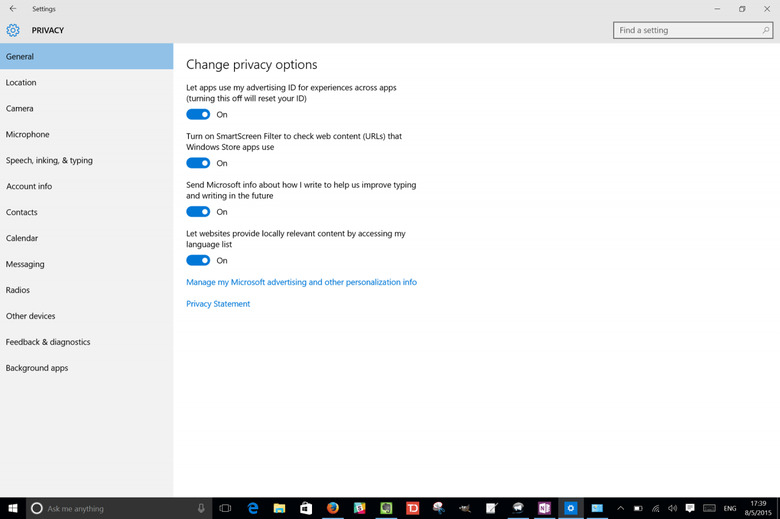Privacy Should Never Be Sacrificed For The Sake Of Free
Yesterday was not a very good day for privacy. First was the revelation that Evernote's new privacy policy will basically allow its engineers to take a peek at any of your notes. Then there's Google's lawsuit settlement, which involves still scanning your (and non-Gmail users') e-mails. And to top it all off, Yahoo has admitted that an even more massive breach happened in 2013, affecting no less than 1 billion accounts. All this should send chills down your spine, and yet most people will probably react to the news with a shrug. Have we become accustomed, even numb, to intrusions of privacy in exchange for service? Common sense tells us we shouldn't, and yet that might not be the case.
Privacy in the 21st century
Until recently, and, to some extent, even up to today, we have taken digital privacy for granted. Almost everyone would agree that privacy, or at least some amount of it, is a basic human right. Charters and laws have been drawn up to protect privacy. And yet, when it comes to computers, smartphones, and the Internet, we seem to be almost too quick to brush it off.
Part of that is because privacy in the digital age isn't as easy to monitor or as clear cut as in the physical world. In the real world, we can build walls or seclude ourselves physically to protect our privacy. Intrusions into physical privacy involve someone actually being there or, at the very least, some physical or mechanical presence, like a camera.
Software, however, has no such physical restrictions. Any limitation on it have to be imposed by convention or laws. And while those definitely do exist, many of us have actually signed them away, all for the sake of convenience.
The price of free
To say that people, especially computer users, today are spoiled, from the instant gratification of social media to the irresistible allure of free content and services. But, as they say, there is no such thing as a free lunch, and those free offers always have a hidden cost.
The most egregious of those will be ads, whether in apps or on websites. Unlike print or TV ads, web and app ads are, most often than not, targeted and personalized. That is, their content varies from instance to instance, depending on who's viewing them. To make that possible, marketers need to keep track of some little bits of data coming from the user, like pages viewed, frequency of visit, etc.

Ad tracking has been one of the most publicized invasions of privacy on the Web, to the point that even web browsers make it a selling point to have features that protect users from such methods. Fortunately, that has gotten a lot easier these days, though users still have to explicitly opt into no tracking modes or features. The default remains "track everything I do so that I can get more relevant ads, whether I like to or not."
Service fee
There are even greater threats to privacy, whether or not you pay to have things like ads removed. Every Internet service you use today has one form of privacy policy or another, and many of them ask you to waive some of your privacy for the sake improving the service. And usually that's true whether you're using it for free, like Gmail or Yahoo! Mail, or paying a monthly fee, like Evernote.
This is where the legal area becomes a bit murky. Or at least that's how companies like to play it. It's a place where many hairs get split between what constitutes an invasion of privacy and what doesn't. Usually, the spiel is that services extract just the minimal amount of information required for the service provider to, for example, know their demographics, study usage patterns, and so on and so forth. There is usually a promise not to sell data to third-parties, but sometimes there's an open acknowledge of "sharing" non-identifiable information with partners.
Things get even more complicated when you start adding phrases like "spam filtering", "personalized recommendations", or even "machine learning". You can even throw in "target ads" as well, in the case of Gmail. These usually involves scanning the user's content. Usually it's done by machine but there might also be a chance of human intervention, as Evernote's case demonstrates.

In these cases, you do agree to those terms and conditions when using the service, but very few people really read the intentionally obscure legalese that comes with those. It is, however, not a blanket permission for companies to start snooping in on your content and activities. And it's even more critical users who didn't agree to those terms of services, like people sending e-mails from another service to Gmail users, as the latest lawsuit against Google points out.
Vigilance is the price of liberty ... and privacy
This isn't an exhortation to ditch all these services to protect our privacy. It's far too late to close that Pandora's box. Our modern society has become so beholden to these services and software that a boycott isn't even just unfeasible. It's near impossible. Perhaps that fact is also what gives companies the gall to try and get away with whatever they can. As long as no one notices.
No, the solution isn't to go cold turkey. You can always try to find less invasive options, but those would still involve the only real solution we can adopt at the moment: being aware. We will probably never going to fully understand the walls of text of legal terms, but, more often than not, someone more knowledgeable already has the Cliff Notes version of it. Simply knowing what you're really signing up for goes a long way in knowing what you should or shouldn't do with a service. Some privacy advocates, for example, would be terribly insulted if you communicated with them using Gmail.

Users also need to take more active steps in securing their digital identities and transactions. Some services do sometimes offers ways out of some tracking. When Windows 10 came out, for example, it default to many options that tracked users. Being aware of such features and options will help minimize what companies can harvest off you, though they're unlikely to fully stop them from squeezing out as much as they can.
Final Thoughts
The Snowden incident sparked both a national and an international cry for security and privacy awareness but, three years later, we seem to be back to square one. Or maybe it never really rocked as many people as it should have. Majority of people today remain complacent in protecting themselves not just against government or criminal snooping but even against companies. Companies who earlier portrayed themselves as champions of user privacy.
Like the situation with fake news, an attitude adjustment is in order. Users can no longer remain unwitting bystanders to their own digital lives. If taking action, like disabling tracking or features, is already too much, simply being aware of the importance of privacy, especially in today's borderless digital and Internet age, should at least be a start. We do pay something for the sake of convenience and comfort, but privacy should never be one of them.
